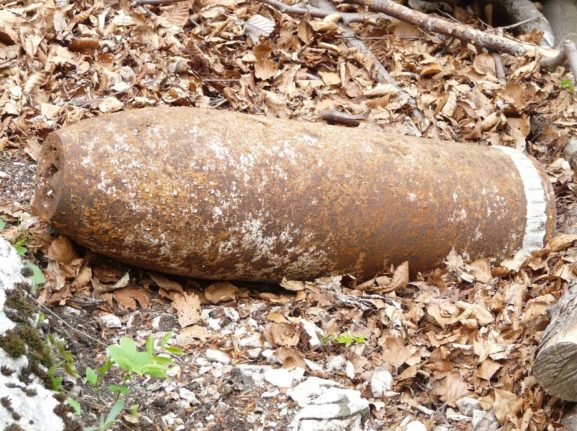How many unexploded bombs are there in Austria?
Up to 15,000 WWII era bombs of up to 250 kg are estimated to be buried all over Austria.
By comparison, Germany’s estimated 100,000 remaining bombs dwarfs that figure. But it’s much more than the number likely lurking underground and underwater in the UK, where the British Ministry of Defence says it’s defused just under 1,000 WWII bombs since 2010.
Despite being 80 years old, Austrian bomb experts say their hermetic seal means most found today are still very dangerous.
“These aerial bombs work just as well now as they did 80 years ago, unfortunately,” Austrian demining service (EMD) disarmament specialist Werner Tobisch told Krone newspaper.
The EMD gets about 1,200 calls a year through its offices in Vienna, Linz, and Graz – some three to four every day. Most concern small munition finds like old grenades or cartridges. Over 300 leftover grenades were disposed of in Austria in 2022. But the team also disarms about 20 to 30 bombs of at least 50 kg in size every year all around the country.
Last year they defused around 31 tonnes of leftover WWII explosives.
The work also still claims lives – long after WWII’s end. In 2003, two members of an EMD bomb disposal crew were killed when a 250 kg leftover American bomb they were trying to defuse exploded near Salzburg.
Where are Austria’s WWII bombs?
Crews say there’s no predicting where the next bomb will be found.
Cities and industrial centres are the most logical places to look due to their strategic importance in WWII. Vienna and Graz were both targeted over 50 times each during Allied air raids, with 100,000 bombs having originally fallen and exploded on the capital alone.
By contrast, Salzburg and St. Pölten were hit 16 and 10 times, respectively.
Although some areas may be statistically more likely to have leftover WWII explosives, Allied bombers also hit smaller towns and more remote areas during the war.

As evidence, EMD has recently defused bombs in Alpine locations at elevations of 2,500m or more, some of which are only reachable by helicopter.
Another bomb was found 40m underwater and required divers to go down and carefully bring it up for disposal.
In July, forestry workers discovered an unexploded Russian bomb near the town of St. Stefan in Styria.
In May, police and bomb squad officers had to evacuate a kindergarten in Döbling – a suburban town near Vienna – to defuse an unexploded bomb on a nearby construction site. Only weeks before, a farmer found a 70 kg old Russian bomb while plowing his field near the tiny town of Neusiedl am See in Burgenland.
In 2023, people in Austria have also found old bombs in a public park and on a football pitch. Wels near Linz has had five bomb scares just since January.
Ultimately, an unexploded WWII bomb could potentially be found just about anywhere in Austria today.
READ ALSO: Vienna Nazi art show seeks to address Austria’s WWII legacy
What should I do if I think there might be a bomb somewhere?
The Austrian EMD doesn’t search for bombs based on anything other than evidence there may in fact be one there.
If you think – or are afraid – there might be a bomb under your property, for example, you have to hire a private survey company to test for it. If they find evidence, they can alert the EMD.
If you do happen to come upon what looks like an unexploded WWII bomb or other munition, you’re advised to keep away from the potential explosive – and keep others away too if you can. Call the police immediately.
Responding officers will then decide whether they need to evacuate the area and call the EMD.



 Please whitelist us to continue reading.
Please whitelist us to continue reading.
Member comments